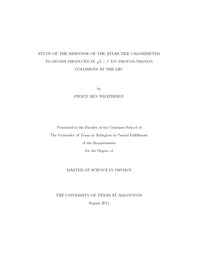
ATTENTION: The works hosted here are being migrated to a new repository that will consolidate resources, improve discoverability, and better show UTA's research impact on the global community. We will update authors as the migration progresses. Please see MavMatrix for more information.
Show simple item record
| dc.contributor.author | Weatherly, Pierce Ben | en_US |
| dc.date.accessioned | 2011-10-11T20:49:24Z | |
| dc.date.available | 2011-10-11T20:49:24Z | |
| dc.date.issued | 2011-10-11 | |
| dc.date.submitted | January 2011 | en_US |
| dc.identifier.other | DISS-11311 | en_US |
| dc.identifier.uri | http://hdl.handle.net/10106/6211 | |
| dc.description.abstract | The purpose of this study is to verify the inter-calibration of the cells and uniformity of the Tile Calorimeter (TileCal) detector in the ATLAS experiment at CERN. The response using muons produced in proton-proton collisions at sqrt(s)= 7 TeV is identified. Muons are efficient calibration tools because they are minimum ionizing particles that deposit nearly constant energy in the calorimeter for a wide range of particle energies. In this study, the tracks of the muons are extrapolated through the calorimeter, and their path lengths through TileCal cells are calculated. The energy, path length, and dE/dx response of the cells are determined. The dE/dx response of each layer and tower is then analyzed for uniformity and compared to Monte Carlo data.Once this has been done, the yield of individual cells is determined by analyzing the number of photo-electrons produced by the muons traversing the scintillating material of the cell. | en_US |
| dc.description.sponsorship | De, Kaushik | en_US |
| dc.language.iso | en | en_US |
| dc.publisher | Physics | en_US |
| dc.title | Study Of The Response Of The ATLAS Tile Calorimeter To Muons Produced In Sqrt(s) = 7 Tev Proton-proton Collisions At The LHC | en_US |
| dc.type | M.S. | en_US |
| dc.contributor.committeeChair | De, Kaushik | en_US |
| dc.degree.department | Physics | en_US |
| dc.degree.discipline | Physics | en_US |
| dc.degree.grantor | University of Texas at Arlington | en_US |
| dc.degree.level | masters | en_US |
| dc.degree.name | M.S. | en_US |
Files in this item
- Name:
- Weatherly_uta_2502M_11311.pdf
- Size:
- 17.08Mb
- Format:
- PDF
This item appears in the following Collection(s)
Show simple item record


